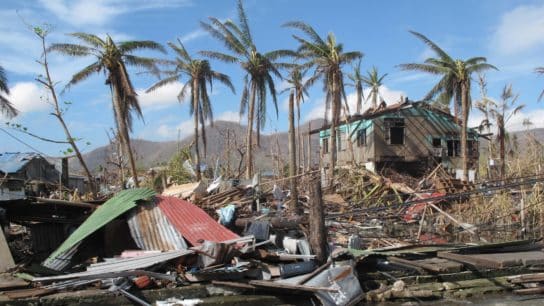Reading the news about climate change and the future of our planet can sometimes be daunting. With reports of decreasing biodiversity, increasing carbon emissions, and scientific predictions of an alarming future surrounding our planet. On a daily basis, we are overwhelmed with news about humanity’s environmental challenges. How do we respond to these negative messages as individuals and conscious participants in this global crisis?
—
Climate change research has extended from decentralized science-based calculations to provide a more inclusive perspective that strives to uncover how various communities comprehend climate change. Emerging scholarly articles, books, and policymakers are engaged in learning more about diverse cultures, religious outlooks, and historical influences that impact how we comprehend climatic events. We are now exposed to numerous interpretive storytelling practices. Climate change researchers and policymakers do not rely anymore on scientific findings alone – climate discourse extends now to studies on how the global phenomenon of environmental change impacts everyone differently, and how these experiences are comprehended. As such, inclusion of culture and society within the climate discourse, has become crucial to understanding how communities around the world respond to climatic events..
Research examining cultural systems and their influence on climate change interpretation has identified many meanings associated with environmental issues. For example, a study from 2021 on Islamic perspectives of climate change identified competing responses on the topic of the primary origin of the climate change phenomenon. Muslims of different nationalities and cultural influences referred to the leading causes of climate change deriving from human or divine actions. The lack of uniform interpretation suggests the complex sociocultural influences that impact how we understand the changing climate.
In line with such cultural diversity, policymakers and researchers aim to learn the most about climate-affected communities to draft effective policies that would see an adaptation of measures to combat increasing impacts such as sea level rise, drought, and other extreme weather events. However, a study from 2013 found that the consideration of cultural worldviews is not necessarily the strongest predictor of environmental policies and actions.
A survey amongst US citizens revealed that discrete emotions were stronger predictors of global warming policy support than culture, religion or sociodemographic characteristics. The study showed that half of respondents felt worried about climate change, whereas 46% were hopeful about it. Other discrete emotions such as anger, helplessness and sadness also accompanied climate change discussions.
In terms of the influence of discrete emotions on policy support, the study revealed that worry was the strongest predictor of participation in climate change policies – the more respondents worried about climate change, the more likely they were to support national policies. Another discrete emotion – fear – was also associated with discussions on climate policies. Interestingly, fear had the opposite effect. Instead of motivating the public to engage in policies, the discrete emotion of fear-induced anxieties distanced the public from further participation. This finding suggests that fear-based messaging about drastic climatic events and global crises can be counter-productive in mobilizing individuals to take climate-friendly actions. However, what happens if we incorporate more positive discrete emotions in climate campaigns?
Indeed, the potential of positive messaging in climate change policies is promising. For example, a study that examined the role of storytelling in climate change communication found that stories with a solution focus were more effective in motivating pro-environmental intentions than those with a catastrophic ending. Readers were inspired and motivated after reading solution-focused stories and were more likely to make climate-friendly choices in the future. This suggests that a shift towards more positive and solution-focused communication about climate change could be beneficial. It prompts us to consider transforming the way we talk about climate change and environmental issues, focusing more on the solutions and less on the problems.

Unfortunately, a uniform solution to mobilize communities worldwide is more challenging. A review of recent articles and studies on the role of emotional engagement in messaging about climate change revealed that there is no “one size fits all” approach to encourage collective action. People’s geographic location, political considerations and personal circumstances impact how we respond emotionally and process complex dilemmas such as climate change. Whereas we cannot presume that each of us will engage in climate policies to the same extent, including positive and solution-focused environmental approaches can indeed result in more productive responses from many people.
Climate change is a complex phenomenon that impacts all of us, and yet, we tend to perceive and experience it through the lens of our geographic location, sociocultural influences and sometimes political affiliations. We are all different and unique individuals, yet to combat climate change, we must come together, get actively involved in environmental policies, and change how we live on the planet. Emotional engagement in messaging, such as news, has proved to motivate people and improve the long-term implementation of climate-friendly measures. One thing is definite – imaginations of crisis and catastrophe are ineffective and can discourage people from taking climate action. For the sake of our planet, we should start motivating each other and perceive our climate futures through the prism of solution and hope.
More on the topic: Bridging the Gap: Addressing Barriers in Climate Change Communication to Save the Planet
This story is funded by readers like you
Our non-profit newsroom provides climate coverage free of charge and advertising. Your one-off or monthly donations play a crucial role in supporting our operations, expanding our reach, and maintaining our editorial independence.
About EO | Mission Statement | Impact & Reach | Write for us














